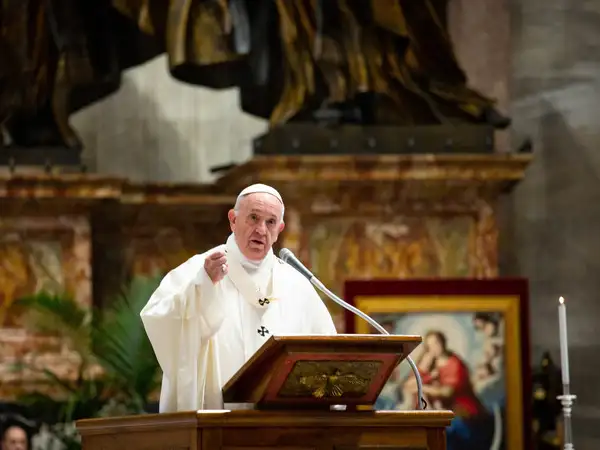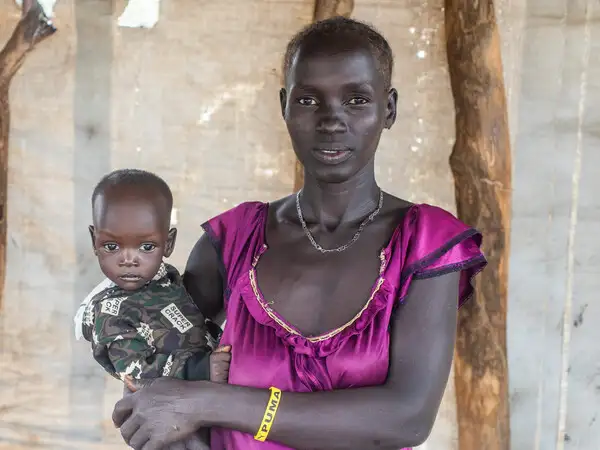
In 2023, an estimated 9.4 million people in South Sudan are expected to need humanitarian assistance.
Pope Francis is visiting the Democratic Republic of the Congo and South Sudan from 31 January to 5 February to meet with people who have been forced to flee their homes to escape violence, to pray for peace and an end to division.
With elections in 2024, it’s hoped that Pope Francis’ visit will inspire those who work tirelessly for peace in what will be a defining year for South Sudan. Local human rights activists have noted the missed opportunities for reform over the past four years, arguing that continued repression, violence and a lack of accountability demonstrates that leaders are unable to deliver peace.
Bishop Stephen Nyodho Ador Majwok of Malakal, South Sudan, spoke about his distress over the conditions of displaced people: "I have just returned from the area where people are most affected and what they need is peace, so that they can go back."
The world's newest country
South Sudan, the world’s ‘newest’ country, gained independence from Sudan in 2011. Two years later, civil war killed an estimated 400,000 people and displaced 4 million internally and across borders. In the years that followed, violent conflict continued. Now, despite the signing of peace deals, the compounding crises of conflict, food shortages, widespread flooding and a lack of access to basic services have led to a dire humanitarian situation.
The Catholic Church in South Sudan has long played a part in working for peace across ethnic and regional divides. In the 1990s, churches across the region came together to create the People to People Peace Process: an effort to bring warring communities together. Aid agencies like CAFOD played a major role, working through the Church network to build peace at a local community level.
Find out more about CAFOD's vital work in South Sudan
More recently, farming families in South Sudan are learning about climate-friendly agricultural practices. CAFOD are reaching displaced families with seeds, tools and training, food and essential goods, as well as safe water through the installation of water pumps.
Nyika Musiyazwiriyo, CAFOD’s Country Representative for South Sudan says: “We see a lot of hope in that people are coming together, planning the destiny of their country. They are putting in a lot of effort, putting up the structures to ensure that children get education. They are working on ensuring that the country develops together with the support of the international community. So there is a lot of hope, there is a lot of enthusiasm in the communities, and we are very hopeful South Sudan will be one of the great nations among the community of nations.”
South Sudan is one of the poorest countries in the world
The effects of poverty are exacerbated by conflict – it’s only possible for people to flourish in times of peace – but the climate crisis also plays a major part in creating instability.
While rich polluting countries fail to act on the climate crisis, the world’s poorest countries continue to face its biggest impacts. South Sudan is no exception. The Global Climate Risk Index ranks South Sudan as the eighth most affected country by impacts of weather. Last year saw the fourth successive year of abnormal rainfall, destroying homes, crops and livelihoods.
Tom Delamere, CAFOD’s deputy country representative for South Sudan says: “The communities in South Sudan are very resilient. Our role as CAFOD is to work with local partners to support those communities if they’re affected by floods or drought, and they’ve had to leave their homes and abandon their crops, often at very short notice.”
World Food Crisis
In June 2022, the World Food Programme announced that it was suspending its food assistance to 1.7 million people due to lack of funding. The cost of getting humanitarian aid to people in South Sudan is exceptionally high because in most cases aid has to be transported by aeroplane due to the lack of accessible roads.


Nyanguet was forced to flee her village in South Sudan with her five children because of conflict.
Women and girls bear the brunt of the crisis
In times of conflict, women often eat less food themselves in order to provide for others. They also carry additional responsibility for sick family members, of whom there are now many more in the absence of access to food, clean water and sanitation, as well as functional health services.
Furthermore, women and girls are spending a lot more time searching for food, water and firewood for survival, reducing the opportunity to attend school and heightening the risk of sexual and gender-based violence.
Despite these growing challenges, there is hope
Tom Delamere continues: “For me, the greatest signs of hope that I see are through the communities we’re working with. One of the best examples of this are the groups we have that come together to save their money. And then people are able to take a small loan from this group, if they want to set up a small business or if they have some expenses that they have to pay. And then they pay that money back to the group. It’s a really great example of a community coming together to support each other, to help each other so that together they can grow.”
“I pray that all may be one.” (John 17:21)
In 2019 leaders from South Sudan, including President Salva Kiir and his rival, the former rebel leader Riek Machar, travelled to the Vatican to meet with Pope Francis. He urged them both to seek out what unites them and overcome what divides them, ensuring them that peace was possible.
At the end of the two-day meeting, Pope Francis knelt and kissed their feet, saying: “I am asking you as a brother to stay in peace. I am asking you with my heart, let us go forward.”
This year’s trip to South Sudan, alongside the Church of England’s Archbishop of Canterbury, Justin Welby and Rt Rev Dr Iain Greenshields from the Church of Scotland, Pope Francis will reiterate this crucial call for peace and unity.
Please pray with us that the people of South Sudan find peace, so that all may flourish

